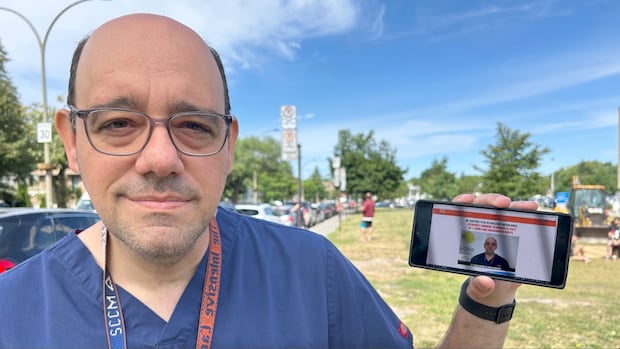Quebec physicians warn of deepfake scams using their likeness to sell medications
'The main issue is that people do buy the stuff that's announced there,' doctor says
Quebec doctors are sounding the alarm over recent deepfake videos that have been appearing online, saying they can erode public trust in the medical system and put people's health at risk.
The AI-generated videos use the likeness of real doctors to give questionable health-care advice and falsely advertise or sell certain products.
"It is something that is putting a lot of damage on all physicians in Quebec and in Canada," said Dr. François Marquis, chief of intensive care at Maisonneuve-Rosemont Hospital in Montreal.
Marquis said he was in disbelief when he first learned his image was being used in a deepfake video.
He received phone calls from people saying "you're all over Facebook," he said, "or that you have discovered something and they want to know if it's true and if they can get the drugs."
Marquis said the problem is that his face is known and that he's trusted.
"So it's not only my patients, it's any patient who's trusting me or any patient trusting physicians at large," he said, explaining how people can be duped.
Dr. Alain Vadeboncoeur, an emergency physician at the Montreal Heart Institute, said his image has also been used to falsely promote various products. In the past week alone, he says four different videos were brought to his attention.
In the videos, he's seen talking about urologic matters, or other topics related to prostate cancer, sexual dysfunction and penis enlargement, he said, adding those aren't in his area of expertise.
"My main concern is about the people. They trust me, I guess, and they follow this advice and they could make their own health in jeopardy because of those," Vadeboncoeur said.
Doctors worry of health risks for patients
Marquis echoed similar concerns surrounding patients' health and the risks involved.
"The first danger is that you don't know what it is that they're taking," Marquis said.
While the product may be inert, it could still cause side effects or react when mixed with other medications or remedies, he explained.
"The other problem is that some people will actually stop taking their usual medication to take this fake drug," Marquis said, including life-saving medication like insulin or blood thinners, for example.
Previously, the most targeted victims of deepfakes were high-profile celebrities, politicians and pro athletes. Using someone who is credible in the community can make it even more difficult to decipher what's real and what's fake.
While Vadeboncoeur doesn't like that his image is being used and manipulated, how he feels about it isn't the issue.
"The main issue is that people do buy the stuff that's announced there," he said, adding it seems to be all about the money and amounts to fraud.
Fenwick McKelvey, an associate professor in information and communication technology policy at Concordia University, said online scams are becoming more personalized because of how simple it is to make AI-generated deepfakes.
"It really creates an issue where you can make these types of frauds more effective, cheaper,and it's harder for the everyday citizen to detect," he said.
Marquis has felt the repercussions of that personally, after a person who was taken for a few hundred dollars in an online scam showed up at the hospital demanding his money back.
"So that's a real problem because it's not just about, you know, me and the deepfake, now it's about the security of the people in the hospital," he said.
Doctors not allowed to promote one product over another
In Quebec, it is against the law for physicians to personally promote the use of one product over another.
"Specifically, saying, 'This medication is better than this one.' We cannot do that," Marquis said.
While there is no straightforward answer on how people can protect themselves, being wary of any endorsements selling products on social media is a good place to start.
"Very often you can at least see some labelling of online ads. When you see that and it looks like it's from someone you might know or a doctor but it's also an advertisement, that's something to be more skeptical about," McKelvey said.
Vadeboncoeur and Marquis are also hoping that raising awareness about the issue will help people make better decisions that won't put their health or wallet at risk.


